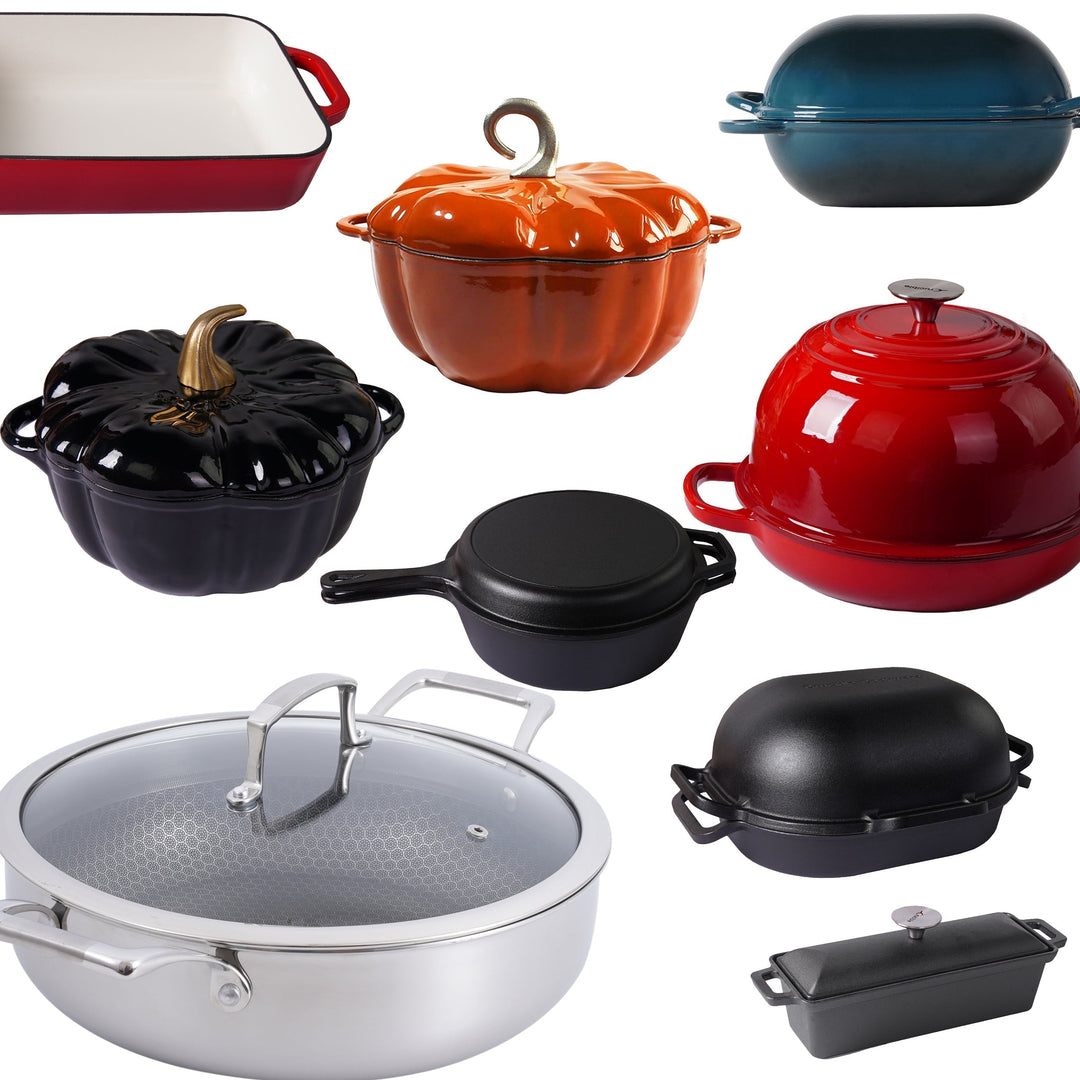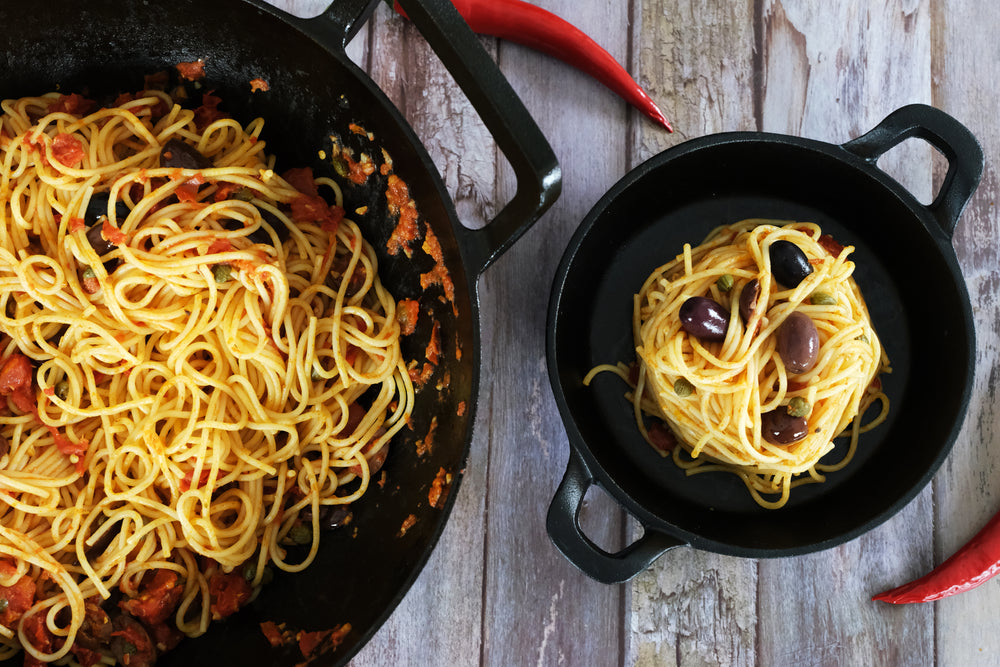Verkenning van wereldwijde smaken: essentiële kruiden voor uw keuken

Specerijen hebben de magische eigenschap om gewone gerechten te transformeren in buitengewone culinaire ervaringen. Elke cultuur heeft een uniek palet aan specerijen die haar keuken definiëren en diepte geven aan de smaken. In dit bericht nemen we je mee op een reis rond de wereld, waarbij we essentiële specerijen verkennen die elke thuiskok in zijn keuken zou moeten hebben. Of je nu een ervaren chef bent of een nieuwsgierige beginner, deze specerijen zullen je inspireren om te experimenteren en wereldse smaken aan je tafel te brengen.
India: Kurkuma
Waarom je het nodig hebt: Kurkuma, bekend om zijn levendige gele kleur en aardse, licht bittere smaak, is een hoeksteen van de Indiase keuken. Het wordt gebruikt in curry's, rijstgerechten en zelfs dranken zoals gouden melk.
Hoe te gebruiken:
- Recepten: Voeg kurkuma toe aan je volgende curry of strooi het in soepen voor extra warmte en kleur.
- Tip: Combineer het met zwarte peper om de opname en gezondheidsvoordelen te verbeteren.
Gezondheidsvoordelen:
- Ontstekingsremmende eigenschappen
- Rijk aan antioxidanten
- Ondersteunt de spijsverteringsgezondheid

Mexico: Komijn
Waarom je het nodig hebt: Komijn geeft een warme, nootachtige smaak aan gerechten en is een basis in de Mexicaanse, Midden-Oosterse en Indiase keukens. Het is verkrijgbaar in zowel hele zaadjes als gemalen vorm.
Hoe te gebruiken:
- Recepten: Gebruik gemalen komijn in chili, taco's en enchiladas, of rooster hele zaadjes en voeg ze toe aan rijstgerechten.
- Tip: Rooster komijnzaadjes in een droge koekenpan om hun volledige smaak vrij te maken voordat je ze maalt of heel gebruikt.
Gezondheidsvoordelen:
- Helpt bij de spijsvertering
- Rijk aan ijzer
- Kan helpen bij het beheersen van de bloedsuikerspiegel

Spanje: Gerookte Paprika
Waarom je het nodig hebt: Gerookte paprika, of pimentón, voegt een zoete, rokerige diepte toe aan Spaanse gerechten. Het wordt gemaakt van gerookte rode pepers en is verkrijgbaar in zoete, bitterszoete en hete varianten.
Hoe te gebruiken:
- Recepten: Strooi gerookte paprika over geroosterde groenten, gebruik het in paella, of voeg het toe aan stoofschotels voor een rokerige kick.
- Tip: Combineer het met knoflook en olijfolie voor een snelle en smaakvolle marinade.
Gezondheidsvoordelen:
- Rijk aan antioxidanten
- Bevat vitamines A en E
- Ondersteunt een gezond gezichtsvermogen

Marokko: Kaneel
Waarom je het nodig hebt: Kaneel is meer dan alleen een zoete specerij. In de Marokkaanse keuken wordt het gebruikt in hartige gerechten zoals tajines en couscous, en geeft het een warme en aromatische smaak.
Hoe te gebruiken:
- Recepten: Voeg kaneel toe aan vleesstoofschotels, gebruik het in kruidenmengsels voor lamsvlees, of meng het door rijstgerechten.
- Tip: Gebruik hele kaneelstokjes voor een mildere smaak of gemalen kaneel voor meer intensiteit.
Gezondheidsvoordelen:
- Ontstekingsremmende eigenschappen
- Helpt de bloedsuikerspiegel te reguleren
- Verbetert de hersenfunctie

Thailand: Citroengras
Waarom je het nodig hebt: Citroengras biedt een unieke citrusachtige smaak die essentieel is in de Thaise keuken, vooral in soepen, curry's en thee.
Hoe te gebruiken:
- Recepten: Plet de stengels en voeg ze toe aan soepen zoals Tom Yum, gebruik ze in marinades, of zet citroengras thee.
- Tip: Verwijder de taaie buitenste lagen en gebruik alleen de zachte binnenste stengel voor het koken.
Gezondheidsvoordelen:
- Antimicrobiële eigenschappen
- Ondersteunt de spijsverteringsgezondheid
- Kan helpen angst te verminderen

Ethiopië: Berbere
Waarom u het nodig hebt: Berbere is een pittige, smaakvolle specerijenmix die wordt gebruikt in de Ethiopische keuken, met chilipepers, knoflook, gember, basilicum, korarima, rue, ajwain, nigella en fenegriek.
Hoe te gebruiken:
- Recepten: Gebruik berbere als rub voor vlees, in stoofschotels zoals Doro Wat, of strooi het over geroosterde groenten.
- Tip: Begin met kleine hoeveelheden als u nieuw bent met deze specerijenmix, want het kan vrij krachtig zijn.
Gezondheidsvoordelen:
- Rijk aan antioxidanten
- Ontstekingsremmende eigenschappen
- Ondersteunt de gezondheid van het hart
Midden-Oosten: Sumak
Waarom u het nodig hebt: Sumak geeft een zure, citroenachtige smaak aan Midden-Oosterse gerechten. Het wordt vaak gebruikt als garnering of gemengd met andere specerijen.

Hoe te gebruiken:
- Recepten: Strooi sumak over salades, gebruik het om gegrild vlees te kruiden, of meng het door dips zoals hummus.
- Tip: Combineer sumak met tijm, sesamzaad en zout om za'atar te maken, een veelzijdige specerijenmix.
Gezondheidsvoordelen:
- Rijk aan antioxidanten
- Ontstekingsremmende eigenschappen
- Kan helpen de bloedsuikerspiegel te verlagen
Tips voor het verkrijgen en bewaren van specerijen
- Koop hele specerijen: Hele specerijen behouden hun smaak langer dan gemalen. Maal ze naar behoefte om maximale versheid te garanderen.
- Bewaar correct: Bewaar specerijen in luchtdichte containers, uit de buurt van licht, warmte en vocht. Een koele, donkere voorraadkast is ideaal.
- Controleer de versheid: Specerijen bederven niet, maar verliezen na verloop van tijd wel hun kracht. Hele specerijen blijven ongeveer 4 jaar goed, gemalen specerijen 2 tot 3 jaar, en gedroogde kruiden 1 tot 3 jaar.

Alles Samenbrengen
Het opnemen van deze wereldse specerijen in uw keuken diversifieert niet alleen uw kookkunsten, maar brengt ook tal van gezondheidsvoordelen met zich mee. Experimenteer met nieuwe recepten, meng specerijen om uw eigen kenmerkende smaken te creëren en geniet van de culinaire reis die continenten overspant—allemaal vanuit het comfort van uw eigen huis.
















Laat een reactie achter